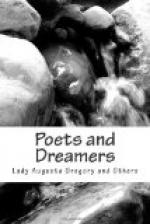’I am weak in my body,
I
am vexed in my heart,
And to-morrow I will be hanged;
Lying beneath the clay,
My
sorrow,
Lying beneath the clay.
’May God give pardon
To
my vexed, sorrowful soul;
May God give mercy
To me now and forever,
Amen!
To me now and forever.’
But translation is poor work. Even if it gives a glimpse of the heart of a poem, too much is lost in losing the outward likeness. Here are the last lines of the lament of a felon’s brother:—
’Now that you are stretched
in the cold grave
May
God set you free:
It’s vexed and sorry
and pitiful are my thoughts;
It’s
sorrowful I am to-day!’
I look at them and read them; and wonder why when I first read them, their sound had hung about me for days like a sobbing wind; but when I look at them in their own form, the sob is in them still:
Nois ann san uaigh fhuair
o ta tu sinte
Go
saoraigh Dia thu
Is buaidhcartha, bronach bocht
ata mo smaointe
Is
bronach me andhiu.
BOER BALLADS IN IRELAND
Yesterday I asked a woman on the Echtge hills, if any of her neighbours had gone to the war. She said: ’No; but I know a great many that went to America when the war began—even boys that had business to do at home; they were afraid of being brought away by the Press.’ On another part of the Echtge hills, where a rumour had come that the police were to be sent to the war, an old woman said to a policeman I know: ’When you go out there, don’t be killing the people of my religion.’ He said: ’The Boers are not of your religion’; but she said: ’They are; I know they must be Catholics, or the English would not be against them.’ Others on that wild range think that this is the beginning of the great war that will end in the final rout of the enemies of Ireland. Old prophecies say this war is to come at the meeting of these centuries; and there is an old Irish verse which seems to allude to this, and which has been thus translated:—
’When the Lion shall
lose its strength,
And
the bracket Thistle begin to pine,
The Harp shall sound sweet,
sweet, at length,
Between
the eight and the nine.’
Lonely Echtge still keeps old prophecies and old songs and some of the old speech, and but few newspapers are seen there; but on the lowland, sympathy with the Boers, and prophecies of their victory, are put into the doggerel English verse that must be poor in form, because a ballad, more than another song, must have a long tradition of folk-thought and folk-expression behind it; and in Ireland this tradition does not belong to the English language. Even the beautiful air of ’The Wearing of the Green’ cannot give poetic charm to such verses as these, which, like the others that follow, have been sung and sold by ballad-singers in market-towns and at fairs, and at country race-meetings, during the last year:—




